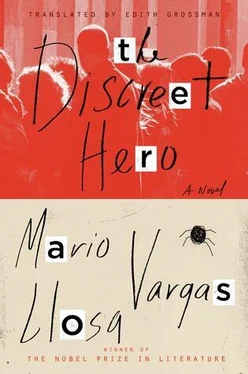While he spoke, she had become very serious.
“More than a gift, it’s a great burden that God put on my shoulders, Felícito,” she said with a sigh. “I’ve said it so many times. I don’t like it when those inspirations come to me all of a sudden. I don’t know where they come from, or why it happens only with certain people, like you. It’s a mystery to me too. For example, I never have inspirations about myself. I’ve never known what’s going to happen to me tomorrow or the next day. Well, to answer your question: Yes, I was in Huancabamba, just one time. Let me tell you something. It makes me very sad that people go all the way up there, spending what they have and what they don’t have, going into debt to get a cure from the masters, that’s what they’re called. They’re liars, most of them at least. The ones who use a guinea pig, the ones who bathe sick people in the icy lake water. Instead of curing them, sometimes they kill them with pneumonia—”
Smiling, Felícito interrupted her, gesturing with both hands. “It’s not always like that, Adelaida. A friend of mine, a driver for Narihualá Transport, his name was Andrés Novoa, had undulant fever and the doctors at the Hospital Obrero didn’t know how to cure him. They said it was hopeless. He went to Huancabamba half dead, and one of the witches took him to Las Huaringas, made him bathe in the lake, and gave him I don’t know what to drink. And he came back cured. I saw it with my own eyes, I swear, Adelaida.”
“Maybe there are some exceptions,” she admitted. “But for each real healer, there are ten crooks, Felícito.”
They talked for a long time. The conversation moved from the witches, masters, healers, and shamans of Huancabamba, so famous that people from all over Peru came to consult them about their illnesses, to the praying women and holy women of Piura, generally humble old women dressed as nuns who went from house to house to pray beside the beds of the sick. They were satisfied with a tip of a few pennies or even just a plate of food for their prayers, which, many believed, completed the work of the doctors by helping to cure patients. To Felícito’s surprise, Adelaida didn’t believe in any of that either. She thought the praying women and healers were liars too. It was curious that someone with her gifts, who could anticipate the future of certain men and women, believed so little in the healing powers of others. Maybe she was right and there were lots of frauds, male and female, among those who claimed to have the power to heal the sick. Felícito was surprised to hear Adelaida say that not so long ago in Piura there had even been certain dark women, the consolers, called on by some families to help the dying pass, something they did in the midst of prayers, cutting the jugular with an extremely long nail they let grow on their index finger for just that purpose.
On the other hand, Felícito was amazed to learn that Adelaida was a steadfast believer in the legend that the image of the Captive Lord in the Church of Ayabaca had been sculpted by Ecuadoran carvers who really were angels.
“You believe in that superstition, Adelaida?”
“I believe it because I’ve heard the story told by the people who live there. It’s been passed from parents to children ever since it happened, and if it’s lasted this long, it must be true.”
Felícito had often heard about that miracle but never took it seriously. It was said that many years ago now, a committee of important people from Ayabaca had taken up a collection to commission a sculpture of Christ. They crossed into Ecuador and found three men dressed in white who turned out to be carvers. They hired them immediately to come to Ayabaca and sculpt the image. They did but disappeared before they were paid their fee. The same committee went back to Ecuador to look for them, but nobody there knew them or anything about them. In other words, they were angels. It was something Gertrudis believed in, but it surprised him that Adelaida would swallow that miracle too.
They chatted for a long time, and Felícito felt much better than when he’d arrived. He hadn’t forgotten his conversations with Miguel and Mabel — maybe he’d never forget them — but the hour he’d spent with Adelaida had helped to cool the memory of the encounters so they no longer weighed on him like a cross.
He thanked Adelaida for the distilled water and the conversation, and though she resisted, he obliged her to accept the fifty soles he put in her hand when he said goodbye.
When he went out, the sun seemed even stronger. He walked slowly toward his house, and on the way only two strangers approached to greet him. He thought, with some relief, that gradually he’d stop being famous and well known. People would forget about the spider, and soon they’d stop pointing him out and coming up to him. Perhaps the day wasn’t distant when he’d be able to walk down the streets of the city again like an anonymous pedestrian.
When he reached his house on Calle Arequipa, lunch was ready. Saturnina had prepared a vegetable broth, the typical tuber-and-dried-beef dish of olluquitos con charqui , and rice. Gertrudis had a pitcher of lemonade with lots of ice ready. They sat down to eat in silence, and only when he’d finished his last spoonful of broth did Felícito tell his wife that he’d seen Miguel that morning and had proposed withdrawing the charges if Miguel agreed to drop his last name. She listened to him in silence, and when he stopped speaking she said nothing.
“I’m sure he’ll accept and then go free,” he added. “And he’ll leave Piura, as I demanded. He’d never find work here with his record.”
She nodded, not saying a word.
“Aren’t you going to visit him?” Felícito asked.
Gertrudis shook her head. “I don’t ever want to see him again either,” she declared, eating the broth in slow spoonfuls. “After what he did to you, I couldn’t.”
They continued eating in silence, and only much later, when Saturnina had cleared the dishes, Felícito murmured, “I was in Castilla too, I’m sure you can guess why. I went to put an end to that matter. It’s done. Finished forever. I wanted you to know that.”
There was another long silence, interrupted at times by the croaking of a frog in the garden. Finally, Felícito heard Gertrudis ask, “Do you want coffee or chamomile tea?”
When Don Rigoberto awoke, it was still dark; he heard the murmur of the ocean and thought, “The day has finally come.” He was engulfed by a sensation of relief and excitement. Was this happiness? Lucrecia slept peacefully beside him. She must be extremely tired, the day before she’d stayed up very late packing. He listened to the movement of the ocean for a while — a music never heard in Barranco during the day, only at night and at dawn, when the street noise subsided — and then he got up and went to the study in his pajamas and slippers. He searched the poetry shelves and found the book of works by Fray Luis de León. In the light of the lamp, he read the poem dedicated to the blind musician Francisco de Salinas. He’d been thinking about it the night before as he was dozing off and then had dreamed about it. He’d read it often and now, after reading it one more time, slowly, barely moving his lips, he confirmed it yet again: This was the most beautiful homage to music he knew, a poem that as it explained the inexplicable reality of music, was itself music. Music with ideas and metaphors, an intelligent allegory by a man of faith, which, filling the reader with an ineffable sensation, revealed the secret, transcendent, superior essence that dwells in some corner of the human animal and begins to rise to consciousness only through the perfect harmony of a beautiful symphony, an intense poem, a great opera, an outstanding exposition of art. A sensation that for Fray Luis, a believer, became confused with grace and the mystic trance. What was the music like, the creation of the blind organist to whom Fray Luis de León wrote this superb eulogy? He’d never heard it. So he had a job to do during his stay in Madrid: obtain a CD with the compositions of Francisco de Salinas. One of the groups dedicated to ancient music — Jordi Savall’s, for instance — must have devoted a record to the man who inspired this marvel of a poem.
Читать дальше

![Гарри Гаррисон - Bill, the Galactic Hero [= The Starsloggers]](/books/87536/garri-garrison-bill-the-galactic-hero-the-star-thumb.webp)










